 MyDogBreeds
MyDogBreeds McNab is originated from United States but Large Munsterlander is originated from Germany. Both McNab and Large Munsterlander are having almost same height. Both McNab and Large Munsterlander are having almost same weight. Both McNab and Large Munsterlander has almost same life span. McNab may have less litter size than Large Munsterlander. McNab requires Low maintenance. But Large Munsterlander requires Moderate maintenance
McNab is originated from United States but Large Munsterlander is originated from Germany. Both McNab and Large Munsterlander are having almost same height. Both McNab and Large Munsterlander are having almost same weight. Both McNab and Large Munsterlander has almost same life span. McNab may have less litter size than Large Munsterlander. McNab requires Low maintenance. But Large Munsterlander requires Moderate maintenance
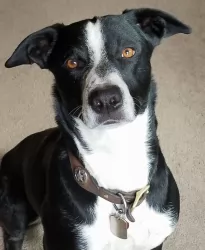 The attractive McNab dog is also known as the McNab Shepherd or McNab Collie. This very lively dog originated in the Mendocino region of Northern California, being specifically bred to withstand tough weather conditions and rough terrain.
The attractive McNab dog is also known as the McNab Shepherd or McNab Collie. This very lively dog originated in the Mendocino region of Northern California, being specifically bred to withstand tough weather conditions and rough terrain.
The dog is becoming popular outside of California now. A Scottish rancher with the surname McNab left Scotland and arrived in California in the 19th century. He crossed Scottish Border Collies with Shepherd dogs and the ranchers in California started using these dogs for herding livestock.
Today they are still being used as herding dogs in California and other countries. The dog isn’t recognized by the American Kennel Club. It was in 2014 that a group of McNab Shepherd breeders established the McNab Shepherd Registry so as to work towards the advancement of the McNab Shepherd.
 The Large Münsterländer hails from the Münster region in Germany. It was in 1919 that the first breed club was founded.
The Large Münsterländer hails from the Münster region in Germany. It was in 1919 that the first breed club was founded.
The dog’s ancestors were different Spaniel breeds as well as the German Longhaired Pointer. The dog quickly became a sought after hunting dog in Europe.
The Large Munsterlander Association of America is the only official breed organization for this dog. The dog was recognized by the United Kennel Club in 2006.
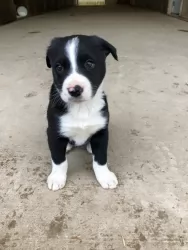 The McNab Dog is a medium-sized working dog. The appearance of this dog varies quite a bit. For instance you may come across a dog with erect ears or floppy ears or a long tail or one that is naturally bobbed.
The McNab Dog is a medium-sized working dog. The appearance of this dog varies quite a bit. For instance you may come across a dog with erect ears or floppy ears or a long tail or one that is naturally bobbed.
When it comes to size, you will find that between the males and females they stand at roughly 40 – 64cm and weigh anything from 14 – 30kg.
Most of these McNabs are black or red with white feet, white tipped tails and white markings around the face. The coat is weather resistant and fairly short and dense. You also get tri-colored McNabs. Eyes are usually a brown or copper color though you might find some with bluish eyes as well.
These are such intelligent dogs so with training and socialization you’ll find he is able to learn easily and quickly. He is a self assured dog, so he will respond well to an owner who is firm and fair, patient, kind and consistent.
He is best suited to life in the country as he needs lots of place to run around. If you don’t live on a farm, take the dog for long walks every day as he requires lots of exercise and mental stimulation. He is a loving family member too, getting along well with kids in the home as well as other pets. He is also a good guard- and watch dog, taking his job as protector of his human family very seriously.
 The medium to large Large Munsterlander stands between 60 to 65cm at the withers and weighs about 28 to 32kg.
The medium to large Large Munsterlander stands between 60 to 65cm at the withers and weighs about 28 to 32kg.
When you look at him, you get the feeling that you’re looking at a springer spaniel. He has long broad feathery ears and also a long feathery tail. The head is fairly broad and somewhat rounded.
The coat of the dog is long and dense, and is quite wavy with feathering around the legs and tail. He can be black and white or be a reddish brown with patches or ticking because of the piebald gene. If you allow your Large Munsterlander to become a parent, the average litter of this dog is 5 to 10 puppies.
The Large Munsterlander is essentially a tracking, retrieving dog. He makes an excellent hunting dog and these instincts are strong within this particular breed. It is why some breeders only give their puppies to serious hunters.
He is an active dog, and because he loves to retrieve, ball games will suit him down to the ground. Take him with you on your walks as he is a naturally athletic, active dog.
He loves water too and won’t need a second invitation from you to jump right into dams or pools. He is such an easy going dog, getting on well with children and pets in the home and being a good first choice for first time dog owners too. However, he requires plenty of exercise.
Because he is a hunting and retrieving dog, he will be far better suited to living in a home where there is a fair sized garden. He isn’t regarded as a city dwelling dog. These are dogs that just love to be outside and running around.
The Large Munsterlander can be a boisterous dog, so teaching him some basic commands such as ‘come, stay, lie-down, sit or heel’ will improve the way he behaves inside the home and when in the company of other people.
Training and socialization will do him the world of good and it means you can take your dog anywhere – he’ll always be well behaved, becoming a calm, gentle dog.
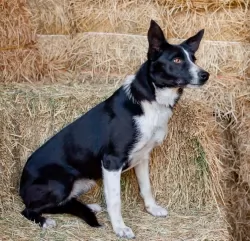 The McNab makes a splendid pet and is known to be even-tempered, being friendly and tolerant with his entire human family.
The McNab makes a splendid pet and is known to be even-tempered, being friendly and tolerant with his entire human family.
He gets on well with children in the home as well as other pets. He has always been a hard working pet and doubles up as being an excellent guard dog too. Those who have had the McNab as a pet say that you couldn’t get a more excellent family canine friend.
 As a sporting dog, the Large Munsterlander loves his exercise. You can involve him in all kinds of outdoor activities, and he’ll readily join in, from swimming, to hiking to ball games to just plain running for the fun of it.
As a sporting dog, the Large Munsterlander loves his exercise. You can involve him in all kinds of outdoor activities, and he’ll readily join in, from swimming, to hiking to ball games to just plain running for the fun of it.
Always be careful with puppies though, before you involve such a young dog with such strenuous exercise. For a better chance of avoiding hip dysplasia, it is better to wait till he is about 12 months old before you involve him in too many lively activities.
He’s an easily trainable dog too, and the fact that he is a calm, gentle dog who is loving and loyal makes him an excellent pet choice.
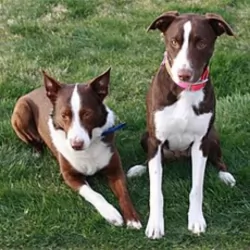 This dog doesn’t really have genetic health issues, but they can suffer with hip dysplasia, a problem that many dogs battle with, whether small or large, young or old.
This dog doesn’t really have genetic health issues, but they can suffer with hip dysplasia, a problem that many dogs battle with, whether small or large, young or old.
They can also suffer with epilepsy and an eye disease such as entropion where the lid of the eye is turned inwards. Check its ears and teeth regularly for infections and keep up to date with his vaccinations.
The McNab is a health dog breed so you aren't likely to face any of these common dog health issues.
 All dogs can develop some health problems no matter how healthy they are, but when they are happy dogs, they’re well fed, exercised and loved, they have a better chance of reaching a ripe old age.
All dogs can develop some health problems no matter how healthy they are, but when they are happy dogs, they’re well fed, exercised and loved, they have a better chance of reaching a ripe old age.
Large Munsterlanders are generally healthy dogs. Some conditions reported in the breed which are highly unlikely to affect your dog, but are good knowing about are hip dysplasia, cataracts and osteochondrosis.
This is a common condition where the joints of quickly growing puppies are affected. The surface of the joint doesn’t convert into bone in certain areas. The result is thickened cartilage which detaches from the surrounding normal cartilage, forming a flap.
Osteochondrosis causes the development of osteoarthritis, affecting certain joints of the dog. Both genetics and the wrong diet are causes of osteochondrosis.
It isn’t always possible to feed your dog wholesome food, but always try to get the very best quality food there is. Also, don’t allow your young Large Munsterlander to be involved in strenuous exercise before he reaches one year of age. Pounding around can put abnormal weight on the joints which can spell problems when the dog is older. Osteochondrosis mostly affects large and giant breed dogs.
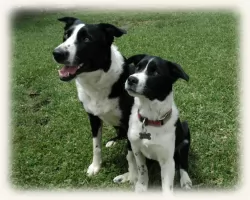 You can feed your McNab dog commercial dry kibble, but then you want to be sure its the best quality one. Buying inferior foods means that you’re getting a whole lot of ingredients in the food that are bad – sugar, salt, preservatives, fillers, colorants etc. Rather go for the best brands that will ensure that your dog is getting all the vitamins and minerals he needs.
You can feed your McNab dog commercial dry kibble, but then you want to be sure its the best quality one. Buying inferior foods means that you’re getting a whole lot of ingredients in the food that are bad – sugar, salt, preservatives, fillers, colorants etc. Rather go for the best brands that will ensure that your dog is getting all the vitamins and minerals he needs.
Homemade food is also important and foods such as boiled chicken, brown rice and pasta as well as cooked or raw vegetables chopped up and added to his dry kibble can make for a delicious, wholesome treat. It will be to his benefit if you can every now and then give him some raw meat as well. Make sure to see that he has a constant supply of fresh, cool water.
McNab Shepherds are very active dogs and they are going to require quite a bit of physical exercise as well as mental stimulation. They are dogs who have been used to herding livestock and he loves this busy life. It is why he wouldn’t be happy living in the city but is better suited to farm life or in a home with a large garden. Long walks and hikes will suit him as well as swimming and joining in every game there is.
The McNab is considered to be a low maintenance dog and grooming the short thick coat will be required twice a week. Always check around the eyes and ears as well as inside the mouth for problems and infections.
 The Large Munsterlander puppy will require 4 meals a day. When he reaches a year of age, you can give him two smaller meals a day.
The Large Munsterlander puppy will require 4 meals a day. When he reaches a year of age, you can give him two smaller meals a day.
He is a large, active dog and if you feed him manufactured dog food, make sure its high quality and that it caters to his age and energy levels. His dry kibble can be mixed with cooked chicken, brown rice or pasta and cooked or raw vegetables occasionally.
Raw meat can be expensive, but every dog requires some raw meat in the diet every now and then. Without some raw meat, you dog may well suffer with skin problems and a dull coat.
If your dog is still an active hunting dog, a high fat, high protein diet will be good for him. When in any kind of doubt, speak to a dog expert or your vet about how to feed him for health and longevity.
As a sporting hunting dog, the Large Munsterlander has high exercise needs. He most certainly won’t do well in a tiny city garden as he is an outdoor dog wanting to be running and exercising. If you choose this particular dog breed, make sure that you take him on walks, allow him off his leash in the park, play ball games with him and take him with you when you go on hikes.
With his silky coat, you want to be brushing your pet twice a week. If he has been out hunting with you, while brushing him, check for twigs, grass and burrs tangled in the hair.
Other basic care includes trimming the nails, keeping the ears clean and dry inside, brushing the teeth with a canine-approved pet toothpaste and toothbrush for good overall health.